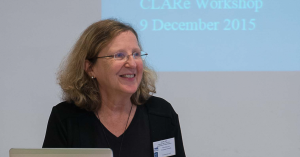I’m delighted that Barbara De Cock and Andrea Pizarro Pedraza from the Université Catholique de Louvain have agreed to write a report on this excellent meeting. Older people tend to be ignored in much language research, and this conference hosted by their university was a welcome way of redressing the balance. Conference images courtesy of Thi Ngoc Linh Tran.

Barbara de Cock
Older adults are better storytellers than younger adults (Abrams/Farrell 2011), which explains why this post about the 2nd workshop of the CLARe (Corpora for Language and Ageing Research) network , co-organized by Annette Gerstenberg (Freie Universität Berlin) and Catherine Bolly (Universität zu Köln), won’t be half as thrilling as it should be in order to do justice to the intensity and variety of topics of this workshop.
Though the main focus of this workshop was on language use, the presenters and audience comprised not only linguists but also involved practitioners (e.g. http://www.lebienvieillir.be) and researchers from different areas, among others through the Louvain4Ageing interdisciplinary consortium.
The link between research and (caring) practice (whether by professionals or by family members) popped up in various ways, including data collection in caring settings, analysis of carer-patient interaction and suggestions about how to adapt language use and interaction when dealing with elderly persons (Charlot) and/or persons with dementia (Hamilton), or how to help them construct autobiographical discourses through reminiscence tasks (Duboisdindien).
As became apparent in this workshop, research on language and ageing raises a number of methodological and theoretical issues that are relevant for any linguistic research or any kind of corpus, e.g. the need to take into account the research questions when collecting and transcribing data (Davis, Kairet). A lot of interesting corpora (albeit some under construction) were presented during two data sessions (Carolina Conversations Corpus, CLARe, LangAge, MultiLing dementia, Ilse, NINFA, Corpage, CorpAGEst, corpus LSFB…), as well as the annotating software ELAN (Boutet).
Together with a round table on funding opportunities and a round table concerning the link between academic research and practice, these sessions fully gave meaning to the ‘work’ in ‘workshop’.
A variety of linguistic topics was dealt with, among others pragmatic space (Wray), fluency and disfluency (Rousier-Vercruyssen), compensation strategies (Gerstenberg), language change in the expression of causal relations (Hekkel), multiparty interaction (Lindholm), and multimodal analysis of gestures in speakers and signers (Bolly, Gabarró-López & Maurent).
While some talks focused on healthy elderly people, others focused on groups with (cognitive) impairments such as dementia. It seems obvious that this is a crucial difference for the analysis of language use and a series of concepts related to it, such as fluency, coherence, memory tasks etc. Yet, it is perhaps not sufficiently taken into account in everyday conversation about elderly people.
Importantly, the workshop underlined that older people have had a whole life behind them. In that sense, focusing only on old age when working with older people may restrict their possibility of performing identities other than “old age”. Thus, a claim was made to take a broader life-span perspective, which acknowledges a full life of experiences.




